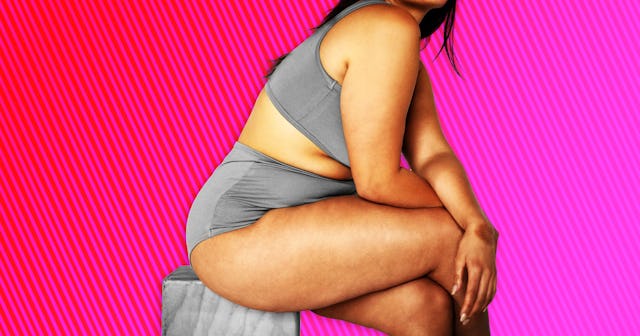We Need To Stop Talking About Thighs Like They're 'Problem Areas'

I’m getting to know my body again, after our third baby, and a global pandemic. You’re gonna think I’m an asshole for saying so, but this is the first time I’ve had belly fat. There’s a few inches of skin that sags and hangs when I lean over to grab something or bend to stretch in downward dog. I like the mom jean trend, because God, can you imagine if we were still supposed to wear low rise? Not only would my thong th-thong thong thong show, but where does a belly go in those things? (I am sorry to everyone on earth for perpetuating this trend.) Also, no one wears thongs anymore. They are a medieval torture device, probably created by a man for his good pleasure, because they have certainly never brought pleasure to me.
With the rise of digital media, body positivity worked its way back into the mainstream. Now we have pictures of women wearing bathing suits proudly, and models like Danae Mercer teaching us how poses hide cellulite, and women like Arielle Estoria posting and writing better about the body. We can curate our feeds, choosing what we will scroll and whose life we will watch. We are unbothered by magazines at the grocery store, because Instagram is more interesting while standing in the checkout line than feeling bad about ourselves because some magazine decided the standard of beauty. And here’s a little life hack: Mark ads offensive. Yes, when your stories are interrupted with ways to lose weight, Spanx-like contraptions, and anti-aging clinics, click those three dots and tell Instagram it’s inappropriate. They’ll stop coming through your feeds, instead of serving as another reminder that your body’s just not good enough.
I cannot remember a time in my life when I have not felt aware of my thighs. Thinking about them, shaping them, changing them, wanting them to be better. There was a little song I grew up hearing: Thunder thighs, thunder thighs, when you see them you’re gonna die. Standing at six feet and two inches by the time I was 16, the word “big” or “big girl” was often used to describe me, even as a scrawny little thing. I thought about my thighs all the time – I assumed every time I stepped into a room that it was the first thing people were judging. If they were thin and sculpted from sports or physical activity, I tended to feel better about myself. If they were not, I felt ashamed. I was taught to constantly work on their thickness, to beat them into submission with stairs and Pilates and strength training. I never let them be what they are – thighs. Not a sign of my worth as a woman or evidence of my hard work, but part of the legs on my body.
Image Source/Getty
Maybe you can relate to this, too. Maybe articles on “which fruit shape is your body type” or addressing “problem areas” or, or “why this skinny white lady is the beauty standard” have shaped your perspective too. But first of all, WTF. Who was looking at a female one day, and thought, you know what, she looks like a pear. Let me write this article real quick and pitch it to Cosmo. And who decided that bellies or thighs or shoulders were problems for us to solve? The last one though is pretty obvious: white supremacy, duh. Blonde, skinny, blue-eyed and able-bodied, as the standard, is kind of a Hitler vibe.
I’m 18 years sober from bulimia and a few other things, and while I’m not tempted to return to that as a coping mechanism, it is strange to birth a baby in a global pandemic and suddenly not recognize my body. Like many women, I got pregnant and had a whole child, moved back to Los Angeles, with just my husband and kids watching the process, and now we’re starting to meet each other in public, and I’m nervous. What if people think I’m a “big girl” now? What if they think my thighs are gross? What if they find out I’m shopping for 14s instead of 10s and judge me hardcore?
These are the old tapes that play in my mind, and if I let them, they determine how I show up in the world. Thighs aren’t gross – they’re thighs. I am big, compared to some people, but I’m the right size for me. And we don’t have to allow the judgment of others to architect our inner world. Your worth is not in what other people think about you. It’s in what YOU think about you.
If it helps, spend some time thinking about where you got the tapes that play in your head. Were you raised with a body part song, too? Did a teacher or friend or partner shame you for how you look, or wish your body looked differently? Facing these memories and identifying lies we believe about ourselves can go a long way in loving who we are again. If we hate ourselves, or feel shame for who we are, or how we look, it’s difficult to accept ourselves, make changes, or grow in wholeness. So, if nobody’s told you lately: You are beautiful. Your body is amazing. And we need to keep reminding each other of this.
Time to wear the shorts, post the bathing suit, show off that gorgeous pandemic body, and get to know yourself again. You are loved, and don’t you forget it.